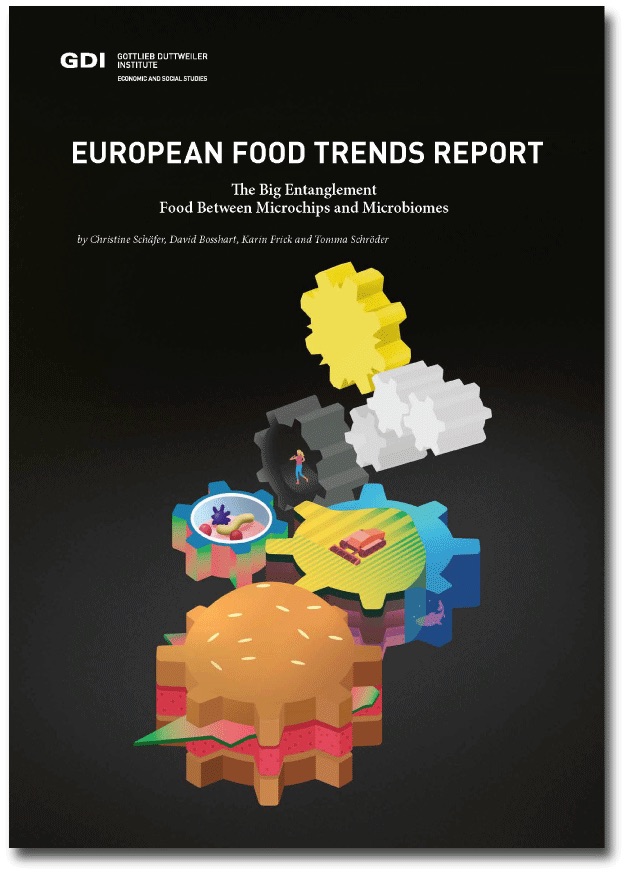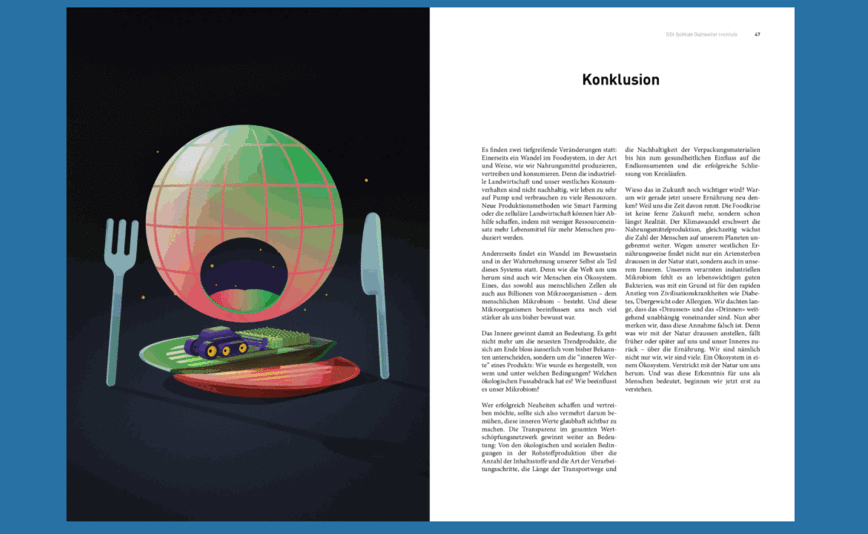European Food Trends Report 2021 (EN)
The Big Entanglement: Food Between Microchips and
Microbiomes
Authors: Christine Schäfer, David Bosshart, Karin Frick, Tomma Schröder
GDI Study No 50
Languages: German, English
2021
The European Food Trends Report 2021 includes:
- Infographics
- Diagrams
- Digression "Germs"
- Future food scenarios
We are a part of nature – and to a far greater extent than we would have ever assumed: Humans are also ecosystems because the body itself contains many trillions of microbes. They live in the gut, in the mucous membranes, on the skin. Without them we are nothing – or much less, undoubtedly not capable of surviving. Bacteria and fungi do not just affect our metabolism, but also our health. And what’s more: these primordial organisms, which were on the planet long before us, are directly linked to the brain and can thus also affect our moods, our being. This invalidates the divide between humans and nature. We cannot exactly say where humans stop and the microbes start. We are "entangled".
Our microbiome degenerates
This however also means that what is outside is reflected inside us. As species diversity diminishes around us, variety in the human microbiome likewise shrinks. Today people in industrialised regions only have half as many species of microbes as persons who hardly come into contact with Western civilisation. Besides destruction of the environment, there is also internal destruction, which is linked by microbiologists to many diseases of civilisation and today’s autoimmune conditions.
The age of biology
The age of chemistry is now giving way to an age of biology. Developments in modern genetic engineering, synthetic biology and new methods of food production also show that the boundary between biology and technology is becoming increasingly blurred.
- Will we succeed in reversing the downward trend with the help of modern technologies such as the production of lab-grown meat, digital precision agriculture, vertical farms, genetically modified, more robust crop varieties and fairer, more sustainable farming?
- Will we manage to become more frugal in general?
- And do this in a manner that not only caters for the latest hipster trends and green fashions, but is truly sustainable?
Such questions are triggered by the "European Food Trends Report – The Big Entanglement: Food Between Microchips and Microbiomes" by the Gottlieb Duttweiler Institute.
Three scenarios for the future of our food system
In an entangled world we need joined-up thinking, if we want to fight hunger, illnesses and the destruction of our environment all at once. The "European Food Trends Report 2021" outlines three scenarios for the future of our food system:
- Stubborn Optimism: The food system does not essentially change but all stages of the value creation network be- come more intelligent, more efficient and more productive. The prevailing narrative here is that all problems can be solved with the right technology.
- Radical Regeneration: This scenario revolves around deglobalisation of the food system. The aim here is not food security but food sovereignty. The plan is to only grow and produce what is sensible under the given conditions and what meets the needs of the regional population.
- Hard Regulations: In this top-down scenario the guidelines for the entire value creation network are laid down by a central control body. This could be a state, an organisation, a private company, or artificial intelligence, which regulates the food system and thus the diets and health of the population.
English: http://doi.org/10.59986/QTXV9110
German: http://doi.org/10.59986/TXEJ5535




